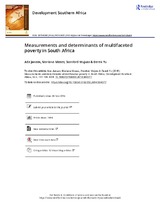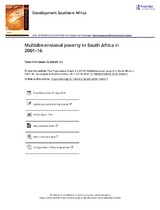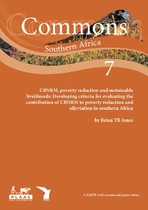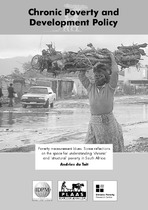Measurements and determinants of multifaceted poverty in South Africa
Abstract
Poverty, despite being a multifaceted concept, is commonly measured in either absolute or relative
monetary terms. However, it can also be measured subjectively, as people form perceptions on
their relative income, welfare and life satisfaction. This is the first study that uses the National
Income Dynamics Study data to analyse poverty across various objective and subjective
methods. The paper finds that while respondents’ poverty status varies across methods, blacks
remain the racial group most likely to be defined as poor by at least one method. The
multivariate analysis reveals that the impact of some explanatory variables, such as experience
of negative events, frequency of crime victimisation, health status and importance of religious
activities, is mixed across methods.
Collections
Related items
Showing items related by title, author, creator and subject.
-
Multidimensional poverty in South Africa in 2001–16
Fransman, Tina; Yu, Derek (Routledge, 2019)This study uses the Census 2001 and 2011 as well as Community Survey 2007 and 2016 data to derive a multidimensional poverty index in South Africa for each year, before assessing the changes in non-money-metric, ... -
CBNRM, poverty reduction and sustainable livelihoods: Developing criteria for evaluating the contribution of CBNRM to poverty reduction and alleviation in southern Africa
Jones, Brian TB (Institute for Poverty Land and Agrarian Studies (PLAAS), 2004)This research paper has been prepared as part of the Centre for Social Studies (CASS), University of Zimbabwe/ Programme for Land and Agrarian Studies, University of the Western Cape (PLAAS) programme ‘Breaking New Ground: ... -
Poverty measurement blues: Some reflections on the space for understanding ‘chronic’ and ‘structural’ poverty in South Africa
du Toit, Andries (Institute for Poverty Land and Agrarian Studies (PLAAS), 2005)This paper explores the challenge of understanding chronic and structural poverty in South Africa, and questions the dominance of the econometric imaginary in present-day development and poverty studies. It argues that ...




